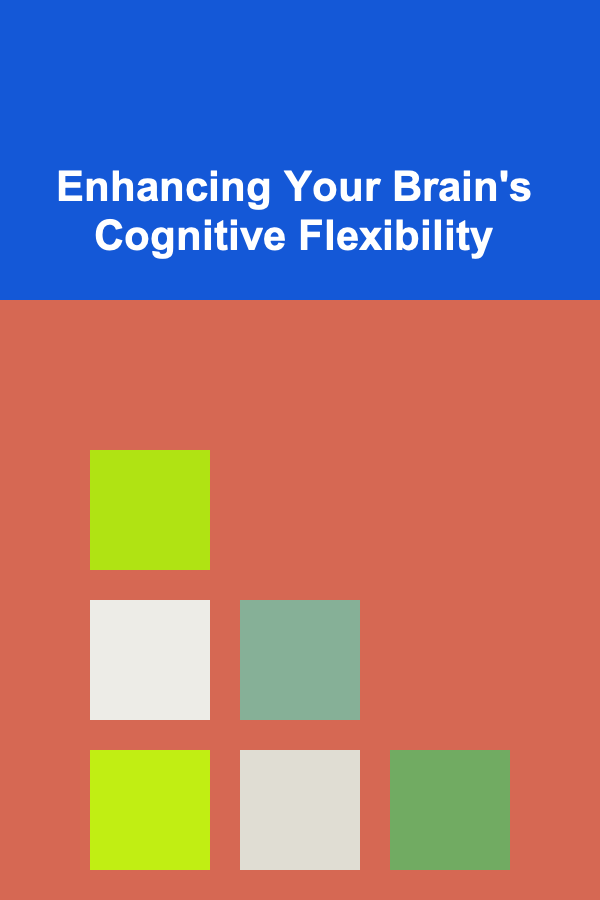
Enhancing Your Brain's Cognitive Flexibility
ebook include PDF & Audio bundle (Micro Guide)
$12.99$10.99
Limited Time Offer! Order within the next:

In today's rapidly changing world, the ability to adapt, learn new things, and think creatively is more valuable than ever. This crucial skill is largely dependent on cognitive flexibility, the brain's capacity to seamlessly switch between different tasks, ideas, and perspectives. Think of it as your brain's mental agility, allowing you to navigate complex situations, solve problems effectively, and embrace change with grace. But what exactly is cognitive flexibility, and more importantly, how can we enhance it?
Understanding Cognitive Flexibility
Cognitive flexibility, also known as mental flexibility or set-shifting, is a core executive function that governs our ability to adjust our thinking and behavior in response to changing demands. It's a complex process involving several brain regions, particularly the prefrontal cortex, which is responsible for higher-level cognitive functions such as planning, decision-making, and working memory. Here's a breakdown of key aspects:
- Task-switching: The ability to efficiently move from one task to another, minimizing the cognitive cost associated with changing mental sets.
- Adaptability: The capacity to adjust your behavior and thinking based on new information or changing circumstances. This involves recognizing that a previous approach is no longer effective and being willing to try something different.
- Openness to new ideas: A willingness to consider alternative perspectives and challenge existing beliefs. This is crucial for creativity and innovation.
- Problem-solving: Cognitive flexibility allows you to approach problems from multiple angles, generating creative solutions and overcoming obstacles. It prevents you from getting stuck in rigid patterns of thought.
- Error correction: The ability to recognize and correct mistakes. This involves quickly analyzing what went wrong and adjusting your approach accordingly.
Individuals with high cognitive flexibility are generally better at handling ambiguity, managing stress, and performing well under pressure. They are also more likely to be successful in dynamic and demanding environments that require constant adaptation. Conversely, deficits in cognitive flexibility can lead to difficulties with learning, problem-solving, and social interactions. Individuals with autism spectrum disorder (ASD) and attention-deficit/hyperactivity disorder (ADHD), for example, often struggle with cognitive flexibility.
The Neurological Basis of Cognitive Flexibility
As mentioned earlier, the prefrontal cortex (PFC) plays a central role in cognitive flexibility. Specifically, the dorsolateral prefrontal cortex (DLPFC) is heavily involved in task-switching and working memory, while the orbitofrontal cortex (OFC) contributes to decision-making and adapting to changing reward contingencies. These areas work together to allow us to flexibly adjust our behavior based on current goals and environmental demands.
Neurotransmitters also play a crucial role. Dopamine, in particular, is essential for cognitive flexibility. It modulates the activity of the PFC and helps to reinforce behaviors that lead to successful outcomes. Studies have shown that manipulating dopamine levels can either enhance or impair cognitive flexibility, highlighting its importance in this cognitive function.
Furthermore, the connections between different brain regions are critical. Cognitive flexibility relies on efficient communication between the PFC and other areas of the brain, such as the parietal cortex (involved in attention and spatial processing) and the anterior cingulate cortex (involved in error monitoring and conflict resolution). Strengthening these connections through targeted training and lifestyle modifications can significantly enhance cognitive flexibility.
Strategies to Enhance Cognitive Flexibility
Fortunately, cognitive flexibility is not a fixed trait. It can be improved through deliberate practice and lifestyle changes. Here are several effective strategies:
1. Embrace Novelty and Challenge Your Routine
One of the most effective ways to boost cognitive flexibility is to introduce novelty into your life. Stepping outside of your comfort zone forces your brain to adapt to new situations and learn new things. This can be as simple as:
- Taking a different route to work or school: This small change forces you to pay attention to your surroundings and think on your feet.
- Trying a new cuisine or restaurant: Exposing yourself to new tastes and experiences stimulates your brain.
- Learning a new skill or hobby: Whether it's playing a musical instrument, learning a new language, or taking up painting, acquiring new skills requires you to adapt and learn.
- Reading books or articles on unfamiliar topics: Expanding your knowledge base exposes you to new ideas and perspectives.
The key is to actively seek out experiences that are different from your usual routine. Don't be afraid to try new things, even if they seem daunting at first. The more you challenge yourself, the more flexible your brain will become.
2. Practice Mindfulness and Meditation
Mindfulness and meditation are powerful tools for improving cognitive flexibility. Mindfulness involves paying attention to the present moment without judgment. This practice can help you become more aware of your thoughts and feelings, allowing you to recognize when you're getting stuck in rigid patterns of thinking.
Meditation, particularly mindfulness meditation, has been shown to enhance cognitive control and reduce mind-wandering. By training your attention, you can improve your ability to focus on the task at hand and resist distractions. This, in turn, makes it easier to switch between tasks and adapt to changing demands.
Start with just a few minutes of meditation each day and gradually increase the duration as you become more comfortable. There are many guided meditation apps and online resources available to help you get started.
3. Engage in Brain Training Games and Puzzles
Certain brain training games and puzzles can specifically target cognitive flexibility. These games often require you to switch between different rules or tasks, challenging your brain to adapt and learn. Examples include:
- N-back tasks: These tasks require you to remember a sequence of stimuli and respond based on whether the current stimulus matches the one presented "N" trials ago. This challenges working memory and task-switching abilities.
- Stroop test: This classic test requires you to name the color of a word while ignoring the word itself (e.g., the word "blue" printed in red ink). This challenges your ability to inhibit automatic responses and switch between different attentional sets.
- Sudoku and crosswords: These puzzles require you to think strategically and solve problems from multiple angles.
- Games that involve rapid decision-making and adaptation: Many video games, particularly strategy games and puzzle games, can improve cognitive flexibility by requiring you to quickly adapt to changing circumstances and make decisions under pressure.
While brain training games can be helpful, it's important to choose games that are evidence-based and designed to target specific cognitive functions. Also, remember that the benefits of brain training may not always generalize to other areas of your life. It's best to combine brain training with other strategies, such as embracing novelty and practicing mindfulness.
4. Challenge Your Assumptions and Beliefs
We all have ingrained beliefs and assumptions about the world. While these beliefs can be helpful in simplifying our lives, they can also limit our ability to think flexibly. Actively challenging your assumptions and beliefs can open you up to new perspectives and possibilities.
Here are some ways to challenge your assumptions:
- Question your beliefs: Ask yourself why you believe what you believe. Are your beliefs based on evidence, or are they simply based on tradition or habit?
- Seek out diverse perspectives: Talk to people who have different viewpoints than you do. Read books and articles from different perspectives.
- Consider alternative explanations: When faced with a problem, try to come up with multiple explanations for what might be happening.
- Practice cognitive reappraisal: This involves changing your interpretation of a situation to reduce negative emotions. For example, instead of thinking "I failed," you might think "I learned something valuable."
Challenging your assumptions can be uncomfortable, but it's essential for fostering cognitive flexibility. By questioning your beliefs, you can open yourself up to new ways of thinking and problem-solving.
5. Engage in Creative Activities
Creative activities, such as writing, painting, playing music, and dancing, can stimulate your brain and enhance cognitive flexibility. These activities require you to think outside the box, experiment with new ideas, and express yourself in unique ways.
Creative activities can also help you develop your imagination and problem-solving skills. When you're creating something, you often encounter unexpected challenges that require you to think creatively to overcome them.
Even if you don't consider yourself to be a "creative" person, you can still benefit from engaging in creative activities. The key is to focus on the process rather than the outcome. Don't worry about whether your creations are "good" or "bad." Just enjoy the act of creating.
6. Prioritize Sleep, Diet, and Exercise
A healthy lifestyle is essential for optimal brain function, including cognitive flexibility. Prioritizing sleep, diet, and exercise can significantly improve your cognitive performance.
- Sleep: Aim for 7-8 hours of quality sleep each night. Sleep deprivation can impair cognitive function, including cognitive flexibility.
- Diet: Eat a healthy, balanced diet rich in fruits, vegetables, whole grains, and lean protein. Avoid processed foods, sugary drinks, and excessive amounts of caffeine and alcohol. Certain nutrients, such as omega-3 fatty acids and antioxidants, are particularly important for brain health.
- Exercise: Engage in regular physical activity. Exercise increases blood flow to the brain and promotes the growth of new brain cells. Both aerobic exercise and strength training can be beneficial for cognitive function.
By taking care of your physical health, you can create a foundation for optimal cognitive function and enhance your cognitive flexibility.
7. Practice Active Recall and Spaced Repetition
Active recall and spaced repetition are learning techniques that can improve memory and cognitive flexibility. Active recall involves retrieving information from memory without looking at the source material. Spaced repetition involves reviewing information at increasing intervals over time.
These techniques force your brain to work harder to retrieve information, strengthening the connections between neurons and improving memory consolidation. They also help you to identify gaps in your knowledge and focus your learning efforts on areas where you need the most improvement.
You can use active recall and spaced repetition in a variety of ways, such as:
- Using flashcards: Write questions on one side of the card and answers on the other. Try to answer the questions without looking at the answers, and then check your work.
- Self-testing: Create quizzes or tests for yourself on the material you are learning.
- Teaching others: Explaining concepts to others forces you to retrieve the information from memory and organize it in a coherent way.
- Using spaced repetition software: There are many software programs and apps that can help you implement spaced repetition.
By incorporating active recall and spaced repetition into your learning habits, you can improve your memory, cognitive flexibility, and overall cognitive function.
8. Play Improvisational Games
Improvisational games, like those used in improv comedy, are fantastic for enhancing cognitive flexibility. These games force you to think on your feet, adapt to unexpected situations, and generate creative responses. Examples include:
- "Yes, and..." One person starts a scene with a statement, and the next person must respond with "Yes, and..." followed by adding something new to the scene. This encourages building upon ideas and going with the flow.
- Character work: Creating and embodying different characters helps you to see the world from different perspectives.
- Storytelling games: Games where you collectively build a story, taking turns adding sentences or paragraphs, force you to adapt to the changing narrative and think creatively about where the story might go.
The key is to embrace the silliness and be willing to make mistakes. Improvisation is all about taking risks and going with the flow, which are essential for developing cognitive flexibility.
The Importance of Consistency and Patience
Enhancing cognitive flexibility is not a quick fix. It requires consistent effort and dedication. Don't expect to see results overnight. It takes time for your brain to adapt and rewire itself. Be patient with yourself, and celebrate your progress along the way. Think of it as building a muscle -- regular exercise yields the best results.
It's also important to find strategies that you enjoy and that fit into your lifestyle. If you find a particular activity boring or tedious, you're less likely to stick with it. Experiment with different strategies until you find ones that you find engaging and rewarding. The more you enjoy the process, the more likely you are to achieve your goals.
Cognitive Flexibility in Different Contexts
The benefits of enhanced cognitive flexibility extend to various aspects of life:
- Workplace: Adapt to changing project requirements, collaborate effectively with diverse teams, and solve complex problems creatively.
- Education: Learn new concepts quickly, adapt to different teaching styles, and manage academic challenges effectively.
- Relationships: Understand different perspectives, resolve conflicts constructively, and adapt to changing relationship dynamics.
- Personal Growth: Embrace change, learn from mistakes, and develop resilience in the face of adversity.
By cultivating cognitive flexibility, you can unlock your full potential and thrive in a constantly evolving world.
Conclusion
Cognitive flexibility is a crucial skill for navigating the complexities of modern life. It enables us to adapt to change, solve problems effectively, and embrace new ideas. While some individuals may naturally possess higher levels of cognitive flexibility, it's a skill that can be developed and enhanced through deliberate practice and lifestyle changes. By incorporating the strategies outlined in this article into your daily routine, you can train your brain to become more flexible, adaptable, and resilient. So, embrace the challenge, step outside of your comfort zone, and unlock the power of your cognitive flexibility.

How to Plan a Family DIY Birdhouse Building Project
Read More
How to Use Mirrors to Enhance and Organize Your Space
Read More
How to Use Vertical Space in Your Home for Efficient Storage
Read More
What Are the Best Furniture Choices for Multi-Functional Spaces?
Read More
Mastering Your Breathing During Exercise: A Comprehensive Guide
Read More
How to Save Money on Educational Supplies: A Comprehensive Guide
Read MoreOther Products

How to Plan a Family DIY Birdhouse Building Project
Read More
How to Use Mirrors to Enhance and Organize Your Space
Read More
How to Use Vertical Space in Your Home for Efficient Storage
Read More
What Are the Best Furniture Choices for Multi-Functional Spaces?
Read More
Mastering Your Breathing During Exercise: A Comprehensive Guide
Read More